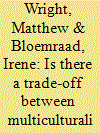| Srl | Item |
| 1 |
ID:
193707


|
|
|
|
|
| Summary/Abstract |
Despite substantial research on descriptive representation for Blacks and Latinos, we know little about the electoral conditions under which Asian candidates win office. Leveraging a new dataset on Asian American legislators elected from 2011 to 2020, combined with pre-existing and newly conducted surveys, we develop and test hypotheses related to Asian American candidates’ ingroup support, and their crossover appeal to other racial and ethnic groups. The data show Asian Americans preferring candidates of their own ethnic origin and of other Asian ethnicities to non-Asian candidates, indicating strong ethnic and panethnic motives. Asian candidates have comparatively strong crossover appeal, winning at higher rates than Blacks or Latinos for any given percentage of the reference group. All else equal, Asian American candidates fare best in multiracial districts, so growing diversity should benefit their electoral prospects. This crossover appeal is not closely tied to motives related to relative group status or threat.
|
|
|
|
|
|
|
|
|
|
|
|
|
|
|
|
| 2 |
ID:
113539


|
|
|
|
|
| Publication |
2012.
|
| Summary/Abstract |
Across immigrant-receiving democracies on both sides of the Atlantic, policies of "cultural recognition" (e.g., "multiculturalism") have become a convenient punching-bag for political elites. Among academics, heated theoretical debates exist over whether such policies foster or hinder immigrants' engagement with their adoptive nation. We provide a novel empirical assessment of this debate from the immigrant perspective. We ask how multicultural and citizenship policies influence immigrants' socio-political engagement with their adoptive nation in three realms: social inclusion, political inclusion, and political engagement. Using a variety of cross-national and single-country surveys, we show that multiculturalism in no case hinders engagement with society and government, and in many cases seems to foster it. Thus, the claim that multiculturalism undermines immigrants' socio-political integration appears largely without foundation.
|
|
|
|
|
|
|
|
|
|
|
|
|
|
|
|
| 3 |
ID:
149366


|
|
|
|
|
| Summary/Abstract |
We argue that widely accepted elitist and “clientelist” models of immigration policy in the United States unduly minimize popular pressure on policy-making. These models portray majority opinion in ways that fail to recognize divergence between the public’s abstract goals for immigration policy and its support for the concrete policy changes needed to achieve them. As a result, they obscure many important instances in which immigration policy accords with public preferences despite counter-pressure from elites and organized lobbies. We demonstrate this point by identifying and explaining gaps between generalized attitudes and beliefs about specific policies in the domains of both legal and illegal immigration, showing that status quo legal admissions policies are not starkly at odds with majority preferences and that, contrary to interpretations of most commercial polling on the topic, majorities reject specific aspects of legalization programs that organized lobbies insist on as components of a “grand bargain” to overhaul an immigration system widely viewed as “broken.” Appreciating the nuance in mass opinion toward immigration policy helps explain policy stagnation that confounds elitist models and suggests that forging ahead with immigration reform will require persuading the public and not only successful bargaining among elites and interest groups.
|
|
|
|
|
|
|
|
|
|
|
|
|
|
|
|